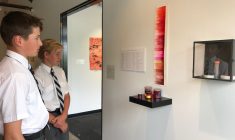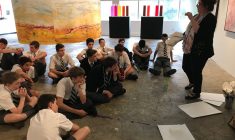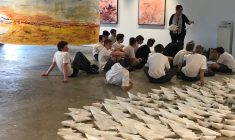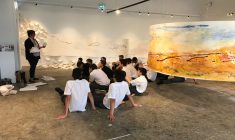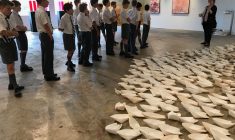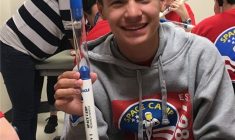Dr Mulford shares the importance of Chapel and exploring faith
Philippians 4:4-9 Rejoice in the Lord always. I will say it again: Rejoice! Let your gentleness be evident to all. The Lord is near. Do not be anxious about anything, but in every situation, by prayer and petition, with thanksgiving, present your requests to God. And the peace of God, which transcends all understanding, will guard your hearts and your minds in Christ Jesus.
Finally, brothers and sisters, whatever is true, whatever is noble, whatever is right, whatever is pure, whatever is lovely, whatever is admirable—if anything is excellent or praiseworthy—think about such things. Whatever you have learned or received or heard from me, or seen in me—put it into practice. And the God of peace will be with you.
In light of this being Dr Mulford’s final term here at Newington, the Chaplains have invited our Head Master to share his views about the importance of Chapel here at the College, as well as the importance of exploring faith in our lives. The newly appointed Chapel prefects interviewed Dr Mulford, asking him a series of questions. Here are some of the responses that our Head Master shared.
Why is it so important that we facilitate chapel services here at Newington?
Newington was founded by the Methodist Church back in 1863, so it is historically appropriate that we honour the foundations on which our school was built. The College has always been open to boys from all faith and life backgrounds, not exclusively to those who are Christian or who are from a Methodist church background. During Chapel, we acknowledge our Christian foundations, whilst honouring the wisdom of those who have contributed to making sense of the world we live in, their pursuit of truth, the likes of those whose names are on our Chapel walls.
How important is it for school’s like Newington to continue exploring the importance of its students developing a faith in God?
Vitally important, as it is part within each of us that reminds us that there is more to life than just ourselves. During PRS classes, we explore various world religions and the role faith plays in our lives. Ultimately, the decisions we make are personal, but it is important that our College continues to plant the seeds of faith and keep the rumour of God alive.
How important is it to you, Dr Mulford, to have a faith in God?
Very important. I grew up attending youth group, then went through a period of time where I questioned what I believed, before re-establishing the importance of having faith in God in my late twenties. This was around about the time of the birth of my first born child, where I was reminded of the miracle that is life. Like in all faiths, you have a spectrum of people who hold to the belief that faith is something that is fairly personal, through to those that hold to an evangelical approach that suggests that we need to try to encourage others to have a particular faith. For me, I’m closer to the fairly personal side in terms of my faith in God, yet it is worth noting that we have a mix of views on faith here at Newington, and that is good.
This applies to the range of interpretations of Holy Scriptures within all religions. One must determine where one stands on the ‘big questions’ in life by reading, listening and reflecting.
I believe strongly in the notion of ‘putting into practice’ my faith, as the Philippians 4 verse indicates. The saying, ‘Religion is often better caught than taught’ resonates strongly with me, as Jesus lived the values that he stood for by treating people with respect, with love and by meeting their needs.
Thank you, Dr Mulford, for your words of wisdom and for sharing this insight into why exploring faith is important to you.
Rev. Geordie Barham
College Chaplain




